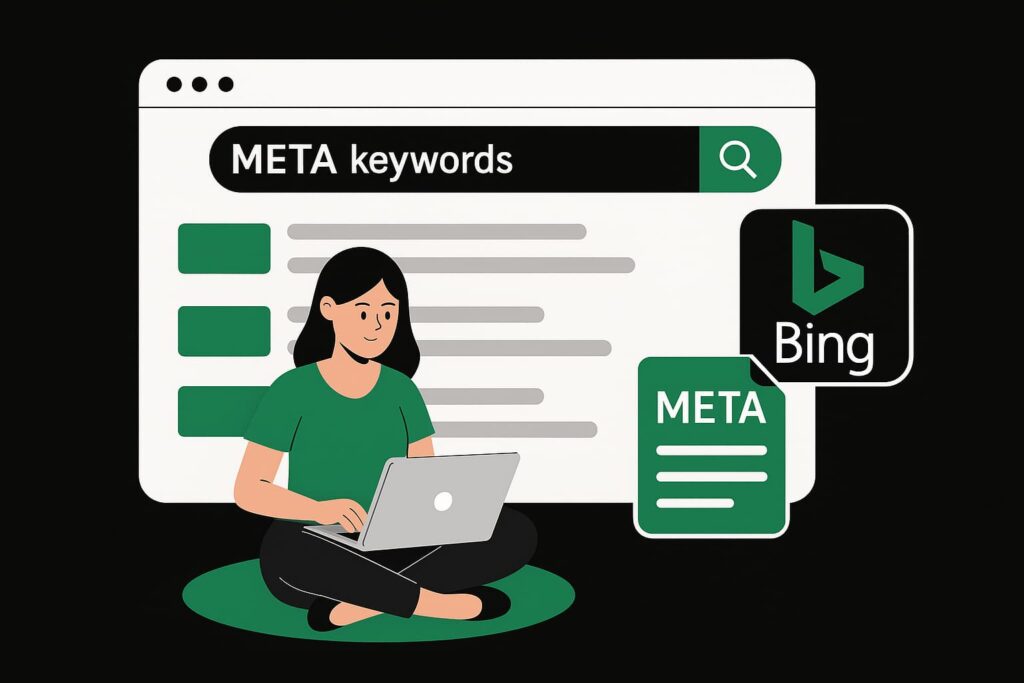Meta keywords once felt like the golden ticket of early SEO add your target keywords in the <meta name=”keywords” …>tag, and you’d signal to search engines what your page was about. But times have changed.
Recent data shows that Bing handles between 9–12% of global search share. This means you’re still talking to a real audience if you care about ranking there.
With that kind of audience, it’s natural to ask: Does Bing still use meta keywords today? Or put differently: is adding that tag a useful SEO tactic for Bing, or just an outdated relic?
In this post, we’ll dig into what Bing says, what the industry sees, and what your best move is.
What Are Meta Keywords?
To start, a quick refresher: the meta keywords tag is an HTML element of the form <meta name=”keywords” content=”keyword1, keyword2, …”>.
It used to be part of how search engines parsed a page’s relevance: you’d list terms you thought mattered, and the crawler would read them. Over time, though, the tag was abused by keyword-stuffing, irrelevant keywords, and manipulation. As a result, major search engines re-evaluated their value.
For example, while Google officially announced long ago that it ignores meta keywords, many site owners wonder whether Bing — with its somewhat different algorithm and smaller competitive playing field — still gives this tag any weight.
The question matters because if it does, it might influence how you optimise for Bing differently from how you optimize for Google.
Related: How To Create Content For Local Landing Pages For Seo
Bing’s Official Position on Meta Keywords
So, what does Bing itself say? Bing Webmaster Tools “Webmaster Guidelines” showsno explicit statementsaying “we use meta keywords for ranking”. The guidelines emphasise things like quality content, user experience, clean crawlable code, and spam-avoidance.
Industry commentary gives us more detail: multiple sources report that Bing treats meta keywords only in the context of spam detection – not as a direct ranking signal.
For example, according to Acciyo: “Bing has stated that meta keywords are not a significant ranking factor, but they might be used as a minor signal in specific scenarios.”Meanwhile, Flyranksays: meta keywords are “ignored for ranking purposes and may even be used as a spam signal.”
Putting this together: yes, Bing recognises the tag, but the consensus is it’s not something you should rely on for ranking. It’s essentially neutral to negative: doesn’t help much, may hurt if abused.
Why Bing Stopped Using Meta Keywords (or Why They Don’t Rely on Them)
There are good reasons every major engine moved away from meta keywords and Bing aligning with that makes sense given the broader evolution of search.
- Manipulation & Spam: When meta keywords were standard, site operators stuffed irrelevant keywords to force rankings. This made the tag unreliable as a relevance signal.
- Better Signals Available: Modern search engines (including Bing) rely on richer, harder-to-game signals: content quality, user engagement, backlinks from trusted domains, social signals, etc.
- Crawl & Index Efficiency: Parsing thousands of tags across the web and assessing their value is resource-intensive. If the benefit is low, better to devote effort elsewhere.
- User Intent over Keywords: Today’s algorithms care more about what the user really means (intent) rather than a list of keywords. That makes the meta keywords tag less relevant.
In short: Bing doesn’t rely on meta keywords because they were superseded by better, robust signals.
What Bing Does Use for Ranking
Since meta keywords are effectively sidelined, it’s worth shining the light on what Bing does care about, so you can optimise accordingly instead of wasting time on a tag with little value.
Here are some of the key ranking factors for Bing, according to recent guides and analysis:
- Content relevance and quality: Bing emphasises pages that directly answer user queries, are well written, well-structured, and clearly scoped.
- On-page signals: For Bing, exact-match keywords in title tags, headings, and meta descriptions still matter more than they do for Google.
- Backlink authority: Bing values links from established, trusted domains (.edu, .gov) and domain age more than sheer volume in some cases.
- Technical and user-experience signals: Page load speed, mobile-friendliness, clear site architecture, crawlability.
- Social signals: Unlike Google, which downplays social media’s direct effect, Bing gives at least some weight to shares, likes, and social engagement.
With that in mind, you can see why meta keywords are low on the list. They simply don’t deliver the depth of signal Bing now uses to determine value and relevance.
Should You Still Add Meta Keywords?
Given the above, you might be wondering: “Should I/Shouldn’t I” use the meta keywords tag for Bing, or for any search engine? Here’s the practical takeaway.
When it’s safe & okay
- If your CMS or template automatically includes the <meta name=”keywords”>tag, and you can include a short, relevant list of keywords without hassle, it’s unlikely to harm your SEO.
- In low-risk scenarios (small site, simple content), you can include them, but treat them as optional.
- If you’re also targeting search engines that do use meta keywords (for instance, smaller/regional ones), then there may be a slight added benefit.
When it’s not worth your time
- If you’re spending precious time crafting long lists of meta keywords instead of working on your title tag, meta description, content structure, and backlinks, then you’re misallocating effort.
- If you include lots of keywords that aren’t reflected in the visible content, you risk being flagged as manipulative.
- If you expect a major ranking boost from meta keywords, you’ll be disappointed. They’re essentially a non-factor for ranking on Bing.
Bottom line:For Bing, meta keywords are optional at best and practically non-impactful for ranking. Instead, focus on elements that Bing does value.
Conclusion
To answer the question directly: No, Bing does not use meta keywords in any meaningful way as a primary ranking signal. Even though Bing recognises the tag, industry consensus and multiple sources confirm that its role is negligible or limited to spam detection.
For your SEO strategy (and especially if you’re working with a brand like Sierra Exclusive that aims for real-growth), the smart move is to focus on modern ranking drivers: content that serves user intent, clean metadata (title & description), a strong backlink profile, mobile-friendly and fast site performance, and social engagement.
Meta keywords? Consider them legacy. And when faced with limited resources (as every marketing team is), allocate your time where it delivers real ROI, not on a tag that has long since lost its ranking influence.
Frequently Asked Questions
Can using a meta keywords tag harm my site’s ranking on Bing?
Not directly, but overstuffing or including irrelevant terms can signal spam to Bing’s algorithm. It won’t improve rankings and could slightly hurt trust signals if abused.
If Bing doesn’t use meta keywords, why do some sites still include them?
Many CMS platforms auto-generate meta keyword fields, and some site owners include them out of habit or for legacy systems. They pose little harm if kept minimal and relevant.
What does Bing officially say about the meta keywords HTML tag?
Bing has confirmed that it does not use meta keywords for ranking and may only reference them for spam detection in rare cases.
Do smaller or non-mainstream search engines use meta keywords?
Yes, a few niche or regional search engines still parse meta keywords to understand page topics, but they’re the exception, not the rule.
Is there any value in meta keywords for internal site search or non-SEO purposes?
Yes, they can help internal search systems or CMS categorization tools index content more efficiently.
Are meta keywords still relevant for any search engine?
Largely no. Major engines like Google, Bing, and Yahoo ignore them for ranking, leaving only minor search engines that might still consider them.

